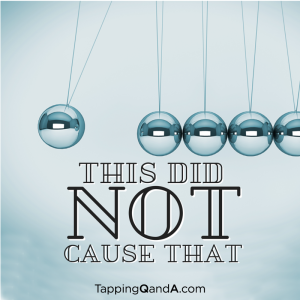
When I am listening to my clients talk about their issues I am not just listening for the meaning of what they are sharing, but I am also listening to the very specific words they are using.
The words we use to describe something will impact the way we understand a situation which then in turn impacts our emotional response to the situation.
The example I love to use is when my client “Deb” said “Everyone at work hates me!”
I asked, “Really, everyone?”
She replied, “No. It's really just Dave and Sue.”
You can see the emotional difference between “everyone” hating us and just two people hating us. (And that doesn't even get into if they really do hate Deb.)
For this reason I pick apart my clients’ speech pattern to understand what is really going on vs. what they are responding to emotionally.
Cause And Effect
One of the places we commonly make the mistake of using words that do not line up with reality is in cause and effect statements.
We use cause and effect statements all the time.
- (cause) Because I was late (effect) I missed out on the sale.
- (cause) Because I didn't return her phone call (effect) she didn't know I was coming.
- (effect) I can now legally work with clients (cause) because I passed the certification exam.
- (cause) I forgot to close the shades (effect) so I didn't sleep in because of the sun coming in the window.
That is not too complicated. The problem comes when we start making statements that aren't accurate in describing their cause and effect relationship.
- (effect) Thing went wrong this morning (cause) because it's Monday.
- (cause) Smoking (effect) causes cancer.
- (effect) I don't have a girlfriend (cause) because the men in my family are bad at relationships.
On the surface all three of these statements seem reasonable, but there are logical flaws in all of them which illustrated with a question or two.
Thing went wrong this morning because it's Monday. Do things go wrong every Monday? Do things not go wrong on other days of the week?
Smoking causes cancer. Does everyone who smoke get cancer?
I don't have a girlfriend because the men in my family are bad at relationships. Are all men in your family bad at relationships?
In all three cases the statements work in absolutes which lead us to react emotionally to situations in a particular way. But when we are able to see the statements for what they are then we are able to react in less emotional fashion.
Ask Questions About The Extremes
The way that we put this knowledge to use is to question our own statements. If there is something you are struggling with write down a statement that describes what you believe about the situation.
Once you have done this start to question it at the extremes. Is it really always this way? Is it really never this way? Does this outcome happen for other reasons?
By doing this we can see things more clearly which will help us to respond in a healthier way.
Leave a Reply